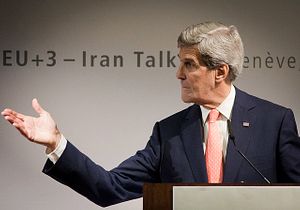Those who were once excited by the concept of a “pivot to the Pacific” have fair reason to be impatient with the Obama administration’s pace of change in grand strategy. Foreign policy is often a reactionary business: one does not always get to pick and choose where to focus time and attention. Whether the distraction is a domestic government shutdown or an unprecedented crisis in Eastern Europe, the president has seen his stated agenda “overcome by events” more than once. Still, the simple fact remains that any efforts to increase the U.S. presence in the Pacific will require a conscious and purposeful reorientation of resources.
Our attention is once again set to be drawn to the Middle East. On July 20, the international community’s interim agreement with Iran will expire. Whether the talks keep moving forward for another six months and Iran’s nuclear program remains effectively frozen or a permanent deal is reached that ensures Iran cannot develop a nuclear weapon under our collective nose, a win for American foreign policy is imminent. Anyone interested in seeing the much delayed rebalance to Asia come to fruition would do well to support both of these positive outcomes, for only in closing a chapter of conflict in the Middle East can we hope to move forward with a new strategy focused on the Pacific.
The Iran negotiations have many practical applications to U.S. policy in the Pacific. First and foremost, they show the value of multilateral diplomacy. Iran was forced to the table by a truly international coalition and a comprehensive sanctions architecture, demonstrating the value of working with allies to achieve a common goal. Our allies can read a successful deal with Iran as a win for constructive conversation and cooperation—a sign that the U.S. has moved on from the unilateral, “diplomacy-be-damned” approach of some neoconservatives. And it is of note that even China, normally committed to its foreign policy of non-intervention, has participated in applying pressure to Iran on such a serious security question.
Relevant also to the question of China, bringing Iran into the international community strengthens the norms that we desire to be taken seriously in the world. At a time when territorial disputes in Asian waters could be the start of a serious global conflict, demonstrating that an aggressive state can be compelled to act in accordance with an international statute like the Nuclear Nonproliferation Treaty sends a valuable message. In the long term, a deal with Iran that avoids both proliferation and armed conflict shows that international cooperation is in the best interest of all parties involved.
Perhaps most fundamentally, however, a war with Iran resulting from the failure of negotiations will cost tremendous amounts of American resources. Admiral Samuel J. Locklear III has repeatedly argued that current U.S. security investments in his theatre of operations—by far the largest, encompassing approximately half the earth’s surface and more than half of its population—are inadequate to project force, assure our allies, and enforce maritime law. The price tag of the last war fought in the name of nonproliferation is passing the $800 billion mark; the U.S. cannot afford another such costly mistake, and it undoubtedly would spell the end of efforts to increase our presence anywhere else in the world.
Ultimately, what happens in Vienna affects every American rather than just those immediately concerned about U.S.-Iranian relations. Some academics and regional specialists have a tendency—for better or worse—to be overly focused on their particular issue, but this is one instance where we must all strive to look at the bigger picture. A deal that resolves the Iranian nuclear conundrum with limits on enrichment and strong international monitoring is simply the only way for U.S. foreign policy to ensure that we can take on the security challenges and economic opportunities presented in the Pacific.
Scott Bates is a former Senior Policy Advisor to the Homeland Security Committee in the U.S. House of Representatives. He is currently President of the Center for National Policy.

































